 W
WAnti-fascism is a political movement in opposition to fascist ideologies, groups and individuals. Beginning in European countries in the 1920s, it was at its most significant shortly before and during World War II, where the Axis powers were opposed by many countries forming the Allies of World War II and dozens of resistance movements worldwide. Anti-fascism has been an element of movements across the political spectrum and holding many different political positions such as anarchism, communism, pacifism, republicanism, social democracy, socialism and syndicalism as well as centrist, conservative, liberal and nationalist viewpoints.
 W
WAnti-German is the generic name applied to a variety of theoretical and political tendencies within the radical left mainly in Germany and Austria. The Anti-Germans form one of the main camps within the broader Antifa movement, alongside the Anti-Zionist anti-imperialists, after the two currents split between the 1990s and the early 2000s as a result of their diverging views on Israel. In 2006 Deutsche Welle estimated the number of anti-Germans to be between 500 and 3,000.
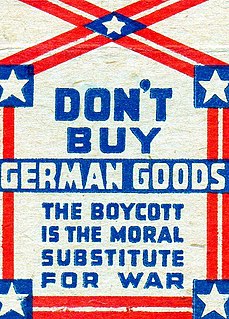 W
WThe anti-Nazi boycott was an international boycott of German products in response to violence and harassment by members of Hitler's Nazi Party against Jews following his appointment as Chancellor of Germany on January 30, 1933. Examples of Nazi violence and harassment included placing and throwing stink bombs, picketing, shopper intimidation, humiliation and assaults. The boycott was spearheaded by some Jewish organizations but opposed by others.
 W
WAnti-fascism is a political movement in opposition to fascist ideologies, groups and individuals. Beginning in European countries in the 1920s, it was at its most significant shortly before and during World War II, where the Axis powers were opposed by many countries forming the Allies of World War II and dozens of resistance movements worldwide. Anti-fascism has been an element of movements across the political spectrum and holding many different political positions such as anarchism, communism, pacifism, republicanism, social democracy, socialism and syndicalism as well as centrist, conservative, liberal and nationalist viewpoints.
 W
WAnti-fascism is a political movement in opposition to fascist ideologies, groups and individuals. Beginning in European countries in the 1920s, it was at its most significant shortly before and during World War II, where the Axis powers were opposed by many countries forming the Allies of World War II and dozens of resistance movements worldwide. Anti-fascism has been an element of movements across the political spectrum and holding many different political positions such as anarchism, communism, pacifism, republicanism, social democracy, socialism and syndicalism as well as centrist, conservative, liberal and nationalist viewpoints.
 W
WGedenkdienst is the concept of facing and taking responsibility for the darkest chapters of one's own country's history while ideally being financially supported by one's own country's government to do so. Founded in Austria in 1992 by Dr. Andreas Maislinger the Gedenkdienst is an alternative to Austria's compulsory national military service as well as a volunteering platform for Austrians to work in Holocaust- and Jewish culture-related institutions around the world with governmental financial support. In Austria it is also referred to as Austrian Holocaust Memorial Service provided by the Austrian Service Abroad. The Austrian Gedenkdienst serves the remembrance of the crimes of Nazism, commemorates its victims and supports Jewish cultural future. The program is rooted in the acknoledgment of responsibility by the Austrian government for the crimes committed by National Socialism.
 W
WThe Battle of Praça da Sé was a conflict between anti-fascists and integralists in the center of the city of São Paulo on October 7, 1934. Brazilian Integralist Action (AIB) had scheduled a rally for that day to commemorate the two years of the Integralist Manifesto, and, as soon as they learned of this intention, antifascists in São Paulo organized themselves to prevent the event from taking place. Although without centralized leadership, all the forces on the left of São Paulo took part in the conflict, which resulted in seven deaths - including an anti-fascist student, three Integralists, two police officers and a civil guard - and around thirty wounded.
 W
WA black bloc is a tactic used by protesters who wear black clothing, ski masks, scarves, sunglasses, motorcycle helmets with padding, or other face-concealing and face-protecting items. The clothing is used to conceal wearers' identities and hinder criminal prosecution by making it difficult to distinguish between participants. It is also used to protect their faces and eyes from pepper spray, which is used by police during protests or civil unrest. The tactic allows the group to appear as one large unified mass. Black bloc participants are often associated with anarchism, anarcho-communism, communism, libertarian socialism or the anti-globalization movement.
 W
WBlackout Tuesday was a collective action to protest racism and police brutality. The action, originally organized within the music industry in response to the killings of George Floyd, Ahmaud Arbery, and Breonna Taylor, took place on June 2, 2020. Businesses taking part were encouraged to abstain from releasing music and other business operations. Some outlets produced blacked out, silent, or minimal programming for 8 minutes and 46 seconds, the originally reported length of time that police officer Derek Chauvin compressed Floyd's neck.
 W
WIn criminal law, Blackstone's ratio is the idea that:It is better that ten guilty persons escape than that one innocent suffer.
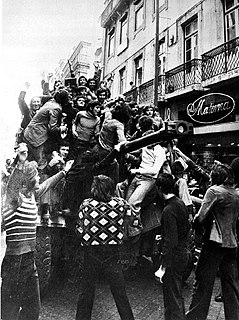 W
WThe Carnation Revolution, also known as the 25 April, was a military coup on 25 April 1974 in Lisbon that overthrew the authoritarian Estado Novo regime, producing fundamental social, economic, territorial, demographic and political changes through the Processo Revolucionário Em Curso, resulting in the Portuguese transition to democracy and the end of the Portuguese Colonial War.
 W
WCastle Park is a public open space in Bristol, England, managed by Bristol City Council. It is bounded by the Floating Harbour and Castle Street to the south, Lower Castle Street to the east, and Broad Weir, Newgate and Wine Street to the north. Its western boundary is less obviously defined and has been the subject of controversy, perhaps because the area around High Street and St Mary le Port Church, though not part of the park and always intended for development, is often considered at the same time as the park.
 W
WFascism is a form of far-right, authoritarian ultranationalism characterized by dictatorial power, forcible suppression of opposition, and strong regimentation of society and of the economy, which came to prominence in early 20th-century Europe. The first fascist movements emerged in Italy during World War I, before spreading to other European countries. Opposed to anarchism, democracy, liberalism, and Marxism, fascism is placed on the far right-wing within the traditional left–right spectrum.
 W
WThe Far-Right Extremism in Europe Initiative is an online resource for practitioners responding to far-right extremism and violence. It was founded with support from the European Commission Prevention of and Fight Against Crime Programme, and a project led by the Ministry of Justice (Sweden) in partnership with the Ministry of Social Affairs (Denmark), Ministry of Security and Justice (Netherlands), Royal Norwegian Ministry of Justice and Public Safety, and the Ministry of the Interior (Finland). It was the first project endorsed by governments and funded by the European Commission solely on far-right extremism and radicalisation in the aftermath of the 2011 Norway attacks perpetrated by a far-right terrorist Anders Behring Breivik. The online resource launched on 1 September 2014.
 W
WFriendly Fascism: The New Face of Power in America is a book written by Bertram Gross, American social scientist and professor of political science at Hunter College, and published on June 1, 1980 by M. Evans & Company as a 419-page hardback book containing 440 quotations and sources. The book examines the history of fascism and, based on the growth of big business and big government, describes possible political scenarios for a future United States. According to a 1981 review in the journal Crime and Social Justice, the book is described as "timely" on a subject requiring serious consideration and is about the dangers of fascism, focusing primarily on the United States, but being aware that monopoly capitalism needs to be understood internationally since capitalism "is not a national mode of production".
 W
WGay fascism is a conspiracy theory alleging that homosexuals were numerous and prominent as a group in the Nazi Party or the identification of Nazism with homosexuality more generally. It has been promoted by various individuals and groups both before and after World War II, especially by left-wing Germans during the Nazi era and the Christian right in the United States more recently. Historians regard the conspiracy theory as having no merit.
 W
WGöteborgs Handels- och Sjöfartstidning (GHT) was a daily newspaper published in Gothenburg, Sweden, from 1832 to 1985.
 W
W"Appeal to the League of Nation Haile Selassie" is the name of a speech given by the Ethiopian Emperor Haile Selassie I on June 30, 1936 at the headquarters of the League of Nations in Geneva, Switzerland. The League allowed him to declare his case and his appearance before the assembled delegates was a moment in history that few who witnessed forgot. The speech concerned the fascist aggression during the second Italo-Ethiopian War in Ethiopia, where the emperor of Ethiopia mainly asked for the end of the war and for international treaties to be respected and for his extreme trust and conviction in the organization of the League of Nations, unity among peoples and nations and declare chemical aggression.
 W
WIn late 1934 and early 1935, the United Australia Party government of Joseph Lyons failed to exclude Egon Kisch, a member of the Communist Party of Germany, from entering Australia.
 W
WOccupy Wall Street (OWS) was a protest movement against economic inequality that began in Zuccotti Park, located in New York City's Wall Street financial district, in September 2011. It gave rise to the wider Occupy movement in the United States and other countries.
 W
WPost–World War II anti-fascism, including antifa groups, anti-fascist movements and anti-fascist action networks, saw the development of political movements describing themselves as anti-fascist and in opposition to fascism. Those movements have been active in several countries in the aftermath of World War II during the second half of the 20th and early 21st century.
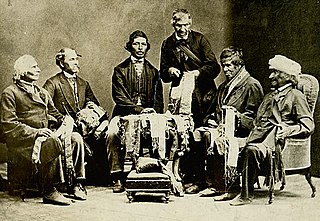 W
WWhile Karl Marx and Friedrich Engels defined communism as a political movement, there were already similar ideas in the past which one could call communist experiments. Marx himself saw primitive communism as the original hunter-gatherer state of humankind. Marx theorized that only after humanity was capable of producing surplus did private property develop.
 W
WJoakim Rakovac was an Istrian anti-fascist, partisan and national hero of Yugoslavia. The circumstances of his death and the identity of his murderers are debated, and he is thought by some to have been murdered by the Yugoslav partisans.
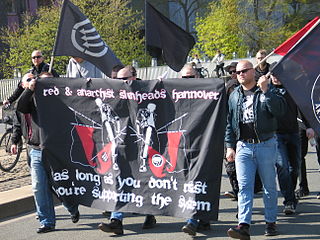 W
WIn the context of the skinhead subculture, a redskin is a marxist skinhead, who often also subscribe to anarchist views. The term combines the word red, with the word skin, which is short for skinhead. Redskins take a militant anti-fascist and pro-working class stance.
 W
WRete degli Studenti Medi is an Italian high-school students' union, created 4 October 2008 from three other student associations active in Italy during the first years of the 21st century.:Rete degli Studenti (ReDS), national association linked to the main Italian Trade union (CGIL), was founded in 2007 after a division in the oldest Italian Students'Union (UdS) caused by the end of the cooperation between UdS and the CGIL; Idee Studentesche in Movimento (ISIM), network of local associations that had tried to get over the split between ReDS and UdS; Studenti di Sinistra (SDS), students' association that supported the DS Party before the birth of the Italian Democratic Party.
 W
WThe Revolutions of 1917–1923 was a revolutionary wave that included political unrest and revolts around the world inspired by the success of the Russian Revolution and the disorder created by the aftermath of World War I. The uprisings were mainly socialist or anti-colonial in nature. Some socialist revolts failed to create lasting socialist states. The revolutions had lasting effects in shaping the future European political landscape, with for example the collapse of the German Empire and the abdication of the German Kaiser.
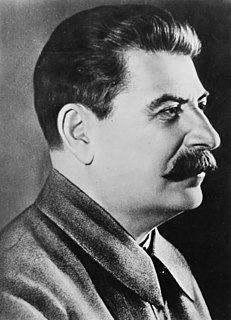 W
WStalinism is the means of governing and policies which were implemented in the Soviet Union from 1927 to 1953 by Joseph Stalin. It included the creation of a one-party totalitarian police state, rapid industrialization, the theory of socialism in one country, collectivization of agriculture, intensification of the class struggle under socialism, a cult of personality, and subordination of the interests of foreign communist parties to those of the Communist Party of the Soviet Union, deemed by Stalinism to be the leading vanguard party of communist revolution at the time.